 About GamePeople
About GamePeople
Subscribe to the Story Gamer column:![]() RSS or
RSS or
![]() Newsletter.
Newsletter.
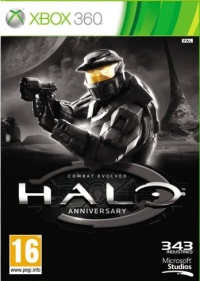
Format:
360
Genre:
Shooting
Style:
Firstperson
Singleplayer
Cooperative
Competitive
Buy/Support:
Support Mark, click to buy via us...
Other GamePeople columnists have reviewed this from their perspective - huh?:
Multiplayer Gamer (360)
Reporting Gamer (360)
Tired Gamer (360)
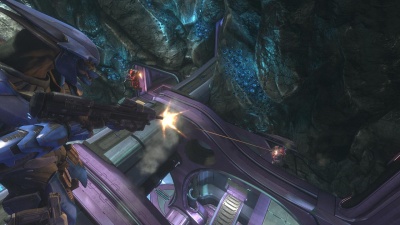
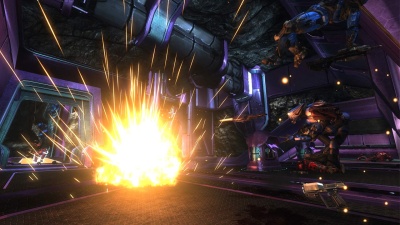
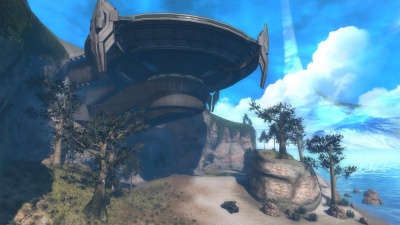
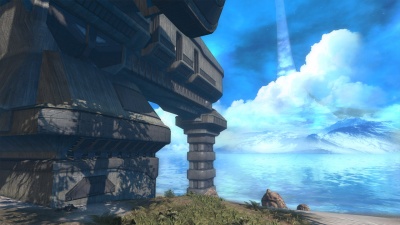

Further reading, films and books that create similar stories:
Halo Anniversary 360 polishes the visuals of the original game to an HD standard, but keeps the gameplay underneath intact. This authenticity is admirable, even when it preserves some of the game's flaws.
Here's a confession of the kind of gap I have in my videogaming knowledge: I never owned an original Xbox, and so with the exception of playing a bit of multiplayer at a pre-launch event, I never actually played the original Halo on first release.
I've subsequently played Halo 3 on my Xbox 360, but dropping in at the end of a trilogy, trying to follow the plot in the loud and chatty atmosphere of online co-op... reader, I didn't understand a word of it.
It's therefore a pleasure to pick up Halo: Anniversary, a lovingly HD-friendly remake of that original game, and finally get some story context for all those explosions.
It's also a chance to catch up on a game that I missed - and, beneath the beautiful HD surface, this is the exact same game as appeared on the original Xbox, to the extent that you can press select at any time and toggle between the updated visuals and the original graphics.
This is entirely admirable, and to be encouraged. While more adventurous remakes like the similarly named Tomb Raider: Anniversary can provide a more thoroughly modernised experience by tweaking mechanics and environments to current sensibilities, there's merit in actually preserving a game as authentically as possible.
If Halo is a classic of the genre - which it undoubtedly is - then providing there's none of the licensing difficulties that make, say, a re-release of the original N64 GoldenEye impossible, then it deserves to be re-presented to a new audience as respectfully and intact as possible, rather than just tearing up history for a quick cash-in.
Going back to the beginning, I finally understood Halo's story, which is relatively simple but so unobtrusive that it's easy to miss, and so large in scale that there's little human element to really relate to. It's telling that the two most vivid and humorous characters in the whole story are Cortana and Guilty Spark 343, who are both artificial intelligences.
Halo's narrative is epic, militaristic science fiction entirely unconcerned with characterisation.
Halo's narrative is epic, militaristic science fiction, vast in scale and scope and almost entirely unconcerned with characterisation or human interaction. It's appeal lies not in relatable human drama but in a sense of awe, and the ability to convey the excitement of journeying through an exotic universe - and blowing things up while you're there.
It's classic space opera, and there's little here that would surprise even the lightest science fiction reader, but a lot to enjoy. The war between humanity and the fanatical Covenant is broad space opera, as is the idea of the Forerunners, mysterious ancient aliens who are long gone but have left scattered artefacts and mysteries across the universe.
The Halo itself, on which faceless, taciturn protagonist Master Chief finds himself deposited after the first level, is a classic science fiction megastructure or Big Dumb Object, a ring in space so big it has an inhabitable environment running around the inside.
The sense of scale in the game is wonderful - there's an instant impression of cosmic vastness that comes from just looking up and seeing the Halo's curve bisecting the sky.
If Master Chief, last (possibly) survivor of a super soldier programme, is a blank protagonist beneath the always-on helmet of his armour, he's also an ideal player character for this kind of game, his enhanced abilities providng a sense of great empowerment without drifting into the overtly cartoonish.
It feels like the right level of superhumanity to be fun, one which makes Master Chief more powerful than the human soldiers around him but not invincible or godlike.
Instead of dank dripping tunnels and feral opponents, Halo is often bright and open.
Diving into the action, it's notable that, initially at least, Halo is violent but doesn't drift into outright horror, breaking a genre link that's run through most examples of gun-toting science fiction since the movie Aliens and, in terms of games, id's original Doom.
Instead of dank dripping tunnels and feral opponents, Halo is often bright and open with clean or lush environments and aliens that are, well, aliens rather than monsters.
While there's no shortage of grey corridors and reactor rooms to be had, there are equally long sections of the game negotiating grassy outdoor areas or imposing but shiny alien structures. The baddies are weird and aggressive but fun and appealing at the same time, especially the diminutive Grunts that run around squealing as they fire at you.
(I highly recommend using the DLC card in Halo: Anniversary's box to activate the free Skull that causes Grunts to explode like grenades when they die: killing one creates a hilarious, albeit dangerous, chain reaction through the ranks.)
In short, Halo is considerably less dour and gross than most SF shooters.
When a degree of horror is introduced in the form of the Flood, it feels quite mild - although hyped as a great threat to sentient life the Flood are a creeping infection, an uppity fungus rather than a manifestation of existential dread like Dead Space's Necromorphs.
For all of the Flood's corpse-possessing antics and wonky zombie heads it's hard to be too scared by a glorified case of athlete's foot, especially when you're spending so much time slapping the spores into a papery mush with the butt of your gun. They're more of a nuisance than scary.
There's a pleasing commitment to logic in Halo's storytelling and action
There's a pleasing commitment to logic in Halo's storytelling and action, a determination to make the Halo feel like a real place where everything that is there is there for a reason - for example ammo for human weapons and health packs aren't just lying around at random, they're dropped by human soldiers who have ventured into areas ahead of Master Chief and died before he got there.
This thread of Master Chief finding bodies in each new environment takes an impressive twist on one level when, after finding one set of bodies, he subsequently finds a recording that explains how they got there, retelling their final moments.
This internal logic, and the very solid sense of geography, does lead to some gameplay problems, mainly a sense of grinding repetition as the game progresses. Travelling to the Halo's control room, or through the Library, can feel like a slog of identical chambers and corridors. It can sometimes be an unofficial mini-game trying to guess whether you've been somewhere before or it's just very similar to all the similar rooms you've gone through already.
Similarly, while it makes sense that Master Chief needs to escape from most of the dangerous structures he enters it can be a final insult to have to hastily backtrack through an entire building that, frankly, you got very bored of on the first pass. New enemies and changes to the environment caused by explosions help shake things up, but not much.
I'm glad that 343 didn't opt to iron out these dated quirks in recreating Halo.
While these repetitions and longeurs feel out of place in an age where big budget actions games strive for a blockbuster pace of variation and excitement, excitably changing environments and mechanics frequently to maintain attention, I'm glad that 343 didn't opt to iron out these dated quirks in recreating Halo.
Halo is what it is and, graphical upgrade notwithstanding, deserves to be experienced as a product of its time. Eleven years on the core of shooter gameplay, the pacing of shootouts in confined and open areas, and the variety provided by different weapon sets and vehicles, remains very solid, sophisticated shooter fun.
If, like me, you never experienced the original Halo first time around, Halo: Anniversary is an excellent chance to catch up, and a high watermark in respectful, well-executed updates of old games.
With Halo 3 and its two spin-offs released straight to 360, this leaves Halo 2 as the only one in the series only available as a straight port. I for one would love to see it getting a similar anniversary polish to complete the set. Any chance, Microsoft?



Mark Clapham writes the Story Gamer column.
"I love a good story. Games tell many different stories: the stories told through cut scenes and dialogue, but also the stories that emerge through gameplay, the stories players make for themselves."
Here are the games I've been playing recently:
© GamePeople 2006-13 | Contact | Huh?

|
Family Video Game Age Ratings | Home | About | Radio shows | Columnists | Competitions | Contact
With so many different perspectives it can be hard to know where to start - a little like walking into a crowded pub. Sorry about that. But so far we've not found a way to streamline our review output - there's basically too much of it. So, rather than dilute things for newcomers we have decided to live with the hubbub while helping new readers find the columnists they will enjoy. |
Our columnists each focus on a particular perspective and fall into one of the following types of gamers:
|